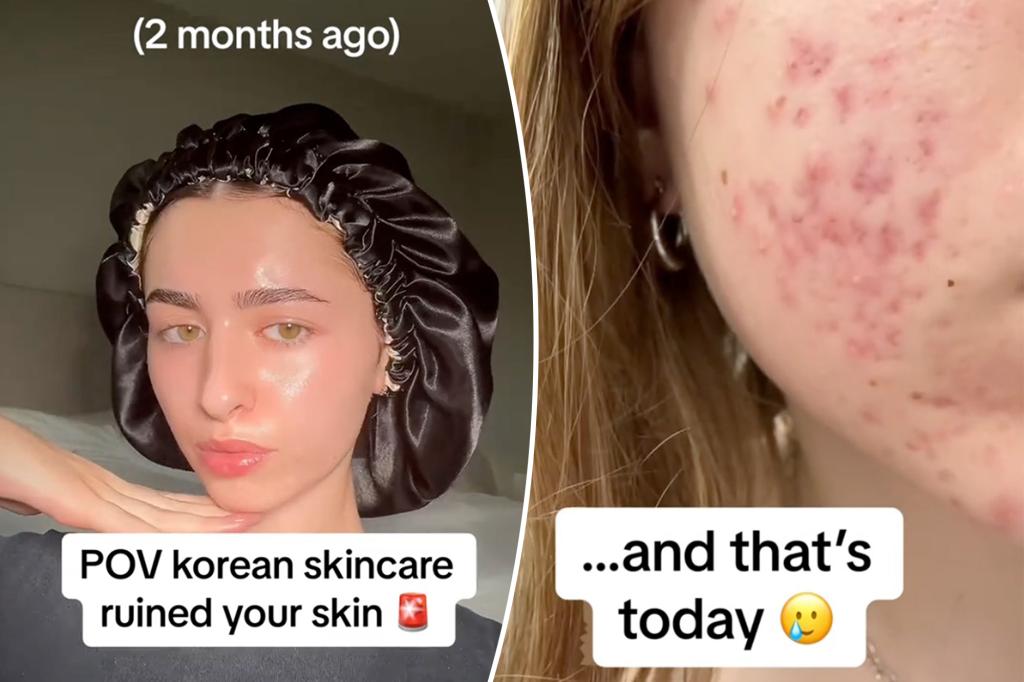The allure of flawless skin, as often portrayed by influencers on social media platforms like TikTok, has led many individuals, particularly young people, down a rabbit hole of elaborate and expensive skincare routines. This trend, often fueled by the hashtag #skintok, promotes multi-step regimens involving a plethora of products, promising glowing, blemish-free complexions. However, the reality for many who have embraced these routines is far from the promised results. Instead of achieving the coveted radiant skin, many individuals are experiencing breakouts, irritation, and other skin issues, leading dermatologists and skincare experts to issue warnings against blindly following these social media-driven skincare fads. The pursuit of perfect skin, ironically, is damaging the very organ individuals are trying to improve.
One of the primary issues with #skintok trends is the sheer number of products being used and the potent ingredients they often contain. Individuals are layering on multiple serums, creams, and masks, often without understanding the interactions between these products or how they will react with their individual skin type. This “more is better” approach overwhelms the skin, disrupting its natural barrier function and causing irritation, inflammation, and breakouts. Dermatologists liken the skin to a delicate fabric that can be damaged by over-washing and exposure to harsh chemicals. The constant barrage of potent ingredients, often used in combination and without professional guidance, essentially wears down the skin’s protective layer, making it more susceptible to problems. The pursuit of a quick fix, fueled by social media’s instant gratification culture, is often counterproductive, exacerbating existing skin issues and creating new ones.
The experiences of individuals like Hannah Chan and Emma Miller, shared through TikTok videos, exemplify the pitfalls of following influencer-promoted skincare routines. Chan spent thousands of dollars on products, only to experience breakouts and skin damage. Miller, influenced by Korean skincare trends popular on #skintok, suffered an allergic reaction to a product, leaving her skin covered in red bumps. These anecdotal accounts, amplified by the platform itself, highlight the real-world consequences of blindly following trends without considering individual skin needs and consulting with professionals. The prevalence of such negative experiences underscores the need for a more cautious and informed approach to skincare, emphasizing the importance of understanding one’s own skin type and seeking professional advice when necessary.
The #skintok phenomenon is particularly concerning when it comes to younger audiences, especially pre-teens and teenagers. The so-called “Sephora kids,” young influencers sharing their often elaborate skincare routines, are inadvertently promoting practices that can be detrimental to developing skin. Experts warn that introducing potent ingredients like harsh chemical acids, exfoliants, and retinol at a young age can disrupt the skin’s natural cycle and cause premature aging. Young skin is naturally more resilient and replenishes faster than mature skin, and overloading it with products designed for older individuals can disrupt the skin’s microbiome and lead to long-term damage. The pressure to conform to these trends, amplified by social media’s pervasive influence, puts young people at risk of compromising their skin health in the pursuit of an unattainable ideal.
Dermatologists and skincare experts emphasize the importance of a simpler, more targeted approach to skincare, particularly for younger individuals. A basic routine focusing on gentle cleansing, moisturizing, and sun protection is often sufficient for healthy skin. Introducing more intensive treatments, if necessary, should be done under the guidance of a dermatologist who can assess individual skin needs and recommend appropriate products and usage. While a multi-step routine might be appropriate for some individuals, particularly those with specific skin concerns, it’s crucial to understand the purpose of each product and how it interacts with other ingredients. Blindly following trends without understanding the science behind skincare can be detrimental, leading to more harm than good.
Ultimately, the key takeaway from the #skintok phenomenon is the importance of informed skincare practices. Rather than chasing fleeting trends and mimicking influencer routines, individuals should prioritize understanding their own skin type, seeking professional advice when needed, and adopting a more measured approach to product selection and usage. Less is often more when it comes to skincare, and a simple, well-chosen routine is far more effective than a complex regimen filled with potentially harmful ingredients. The pursuit of healthy skin should be a journey of self-discovery and informed choices, not a blind pursuit of social media-driven ideals that can ultimately compromise skin health. Real beauty comes from within, reflecting a healthy and balanced approach to skincare, not from a cabinet overflowing with products promoted by influencers.













